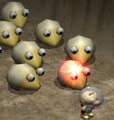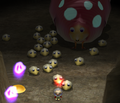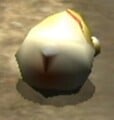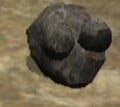Bulborb Larva: Difference between revisions
No edit summary |
(Cleanup to the gallery.) |
||
| Line 219: | Line 219: | ||
P2 Bulborb Larva Defeated.jpg|A Bulborb Larva dying from an attack. | P2 Bulborb Larva Defeated.jpg|A Bulborb Larva dying from an attack. | ||
P2 Bulborb Larva Petrified.jpg|A Bulborb Larva being petrified. | P2 Bulborb Larva Petrified.jpg|A Bulborb Larva being petrified. | ||
Bulborb Larva P2S icon.png|The [[Piklopedia (Pikmin 2)|Piklopedia]] icon of the Bulborb Larva in [[Pikmin 2 (Nintendo Switch)|the Nintendo Switch version of ''Pikmin 2'']]. | |||
</gallery> | </gallery> | ||
===''Pikmin 4''=== | ===''Pikmin 4''=== | ||
<gallery> | <gallery> | ||
Pikmin 4 empress bulblax.jpg|Bulborb Larvae, alongside their mother. | Pikmin 4 empress bulblax.jpg|Bulborb Larvae, alongside their mother. | ||
</gallery> | |||
===Other=== | |||
<gallery> | |||
P2 Bulborb Larva E-Reader Card.jpg|The Bulborb Larva's [[e-card]], #09 (6<sup>th</sup> yellow card). | |||
</gallery> | </gallery> | ||
==Trivia== | ==Trivia== | ||
* Bulborb Larva do not have an animation for standing still. When viewed from out of their detection range they'll use their walking animation, appearing to endlessly wriggle in place. | * Bulborb Larva do not have an animation for standing still in ''Pikmin 2''. When viewed from out of their detection range they'll use their walking animation, appearing to endlessly wriggle in place. | ||
* In ''Pikmin 2'', the model for Bulborb Larva does not have a texture file. Instead, the model uses vertex colors. | * In ''Pikmin 2'', the model for Bulborb Larva does not have a texture file. Instead, the model uses vertex colors. | ||
*Prior to ''Pikmin 4'', its scientific name (''Oculus bambinii'') indicated that it did not belong to the same species as its progenitor, the Empress Bulblax (''Oculus matriarcha''). Unfortunately, its new name (''Oculus kageyamii'') is still a misnomer, lacking the subspecies classification (''Oculus kageyamii matriarcha'') the Empress Bulblax is under. | *Prior to ''Pikmin 4'', its scientific name (''Oculus bambinii'') indicated that it did not belong to the same species as its progenitor, the Empress Bulblax (''Oculus matriarcha''). Unfortunately, its new name (''Oculus kageyamii'') is still a misnomer, lacking the subspecies classification (''Oculus kageyamii matriarcha'') the Empress Bulblax is under. | ||
Revision as of 08:15, November 10, 2023
| |||
|---|---|---|---|
| Appears in | Pikmin 2, Pikmin 4 | ||
| Scientific name | Oculus bambinii (Pikmin 2) Oculus kageyamii larva (premolt) (Pikmin 4) | ||
| Family | Grub-dog | ||
| Areas | Sun-Speckled Terrace (night), Blossoming Arcadia (night), Primordial Thicket (night) | ||
| Caves | Frontier Cavern, Hole of Heroes, Burrow of Beginnings, Trial of the Sage Leaf, Cradle of the Beast, Cavern for a King | ||
| Challenge Mode stages | Emperor's Realm | ||
| Dandori Challenge stages | None | ||
| Dandori Battle stages | None | ||
| 2-Player Battle stages | None | ||
| Attacks | Eat Pikmin | ||
Bulborb Larvae (ベビーチャッピー?, lit.: "Baby Chappy") are enemies in Pikmin 2 and Pikmin 4. As their name would imply, they are juvenile Bulborbs. They have the typical beige snout of Bulborbs, but their behind is white with only a dab of red on the very end. A small, pointy appendage can be seen below the red spot, its use is unknown; it could be some form of tail, or an umbilical cord. Given that they are young, their size isn't much larger than that of a leader. They are the true juvenile grub-dogs, as Dwarf Bulborbs are members of the breadbug family and merely imitate Bulborbs. They are hard to kill in swarms, but have low health. Bulborb larvae are infamous for their ability to quickly kill Pikmin: the creature's bite is fast and fatal. However, the small creatures can be destroyed with one punch from a leader, so it is considered more effective to keep Pikmin away from the Larvae and attack with Olimar and his partner.
Bulborb Larvae are continuously born from certain Empress Bulblaxes. Only 50 can be on the sublevel at once, and once that cap is reached, the Empress falls asleep; it will reawaken once only 25 or less are alive and start producing more. If the Empress is woken up via Pikmin attacks it will also not begin to produce more until there are 25 or less left. The Empress' rolling attack can also crush these enemies, making it useful to clear out a large amount of Larvae.
Upon reaching their first molt, Bulborb Larvae metamorphose into Albino Dwarf Bulborb.
Stats
| Game | Weight | Max. carriers |
Seeds | Value | Health | Regen. |
|---|---|---|---|---|---|---|
| N/A | N/A | N/A | N/A | 5 | No | |
| N/A | N/A | N/A | N/A | 1 | No |
Behavior
Right as soon as they are born, the Larvae squeal and begin being active right away. They crawl along the floor, pursuing the closest leader in a straight line, and actually ignoring any Pikmin. This can be used to the player's advantage, by having one leader serve as bait. If it gets close to a leader or Pikmin, it will bite down, quickly and deadly. If it gets a Pikmin, it will chew on it for a very short amount of time. Although it can only eat one Pikmin at a time, the speed at which they feast and the sheer number of them can be devastating for an army of Pikmin. Moreover, unless the player uses an ultra-bitter spray, the creature does not release the Pikmin it is eating, which means the Pikmin cannot be saved even if the creature is supposed to be dead. The members of the Mandiblard family have a similar behavior, in Pikmin. Upon dying, it will melt away, and eventually disappear; one out of every five times, the Bulborb Larva will leave behind nectar. If a Purple Pikmin does the final blow, green mucus will splat out on the ground, and the creature will be shown dying more agonizingly.
Locations
Pikmin 2
Since these larvae can only spawn from certain Empress Bulblaxes, they cannot be found in any place without one.
- Story Mode
- Frontier Cavern, sublevel 8
- Hole of Heroes, sublevel 11
- Challenge Mode
- Emperor's Realm, sublevel 4
Pikmin 4
Bulborb Larvae are more common than they were in Pikmin 2. Outside battles with an Empress Bulblax, many larvae either roam freely in groups or spawn infinitely from dirt-mounds until the mounds are destroyed.
- Areas
- Sun-Speckled Terrace: There are four Bulborb Larva nests during the Meandering Slope night expedition.
- Blossoming Arcadia: There are two larva nests during the Misshapen Pond night expedition.
- Primordial Thicket: There are two larva nests during The Sylvan Gate night expedition.
- Caves
- Burrow of Beginnings, sublevel 1
- Trial of the Sage Leaf: Story 7, "One Fell Jump", contains freely roaming Bulborb Larvae. Story 10, "The Purple Key", contains one larva nest.
- Cradle of the Beast, sublevel 3: Larvae are spawned infinitely from an Empress Bulblax. There are also some freely roaming specimens in the corridor leading to the boss arena.
- Cavern for a King, sublevel 17: Larvae fall from the ceiling each time the Empress Bulblax rolls.
Strategy
|
The following article or section contains guides. |
Although the larvae have quick bites, their health is rather low. A single punch from a leader is enough to kill a larva. After defeat, it has a 1 in 5 chance of dropping nectar.
In Pikmin 4, Bulborb Larvae may spawn from certain dirt mounds. These mounds will continually produce Larvae until they are excavated, requiring the player to clear out the larvae long enough for the Pikmin to remove the mound.
Pikmin
The best way to kill a Larva with a Pikmin is to use Purple Pikmin. Purple Pikmin are capable of stunning and even killing a large group of Larvae. While eaten Pikmin can be saved by killing the creature before it finishes chewing, Bulborb Larvae are infamous for the small size of this time window, so attacking them with a leader instead is recommended.
A different strategy is to stun them with about three or four Purples, then call them back and throw a lot of Pikmin on the mother. If done quickly enough, it will roll over its larva, killing them.
It is not recommended to use Yellow Pikmin to defeat Bulborb Larva due to Yellow Pikmin's high trajectory when thrown; the Pikmin may miss the enemy and it may be too late to whistle them back. Red and Blue Pikmin may also be an unwise choice due to lower speed. White Pikmin are a better choice for speed, and in case the Bulborb Larva eats the Pikmin, their poison will at least finish them off.
Another way is to get the Pikmin you do not need and try to kill them in swarms by controlling them, though this method is not recommended as it can cause a lot of fatalities.
To note is that you should be careful with the pools of nectar, seeing that if a non-flower Pikmin touches one, it will drink it and become vulnerable until it is done.
Leaders
A single punch from a leader is sufficient to kill a Bulborb Larva. Caution is advised, though, as they may still sneak in a bite as they are dying. The Rocket Fist, found in the same dungeon as the first encounter with the larvae can be used to kill many of them at once due to its range increase on the third strike.
A tactic that can be used in the later Empress Bulblax battles is to allow several dozen Larvae to be born, then attack the Empress so it can roll around the cavern. As this happens, almost every single Larva will be killed, releasing a number of pools of nectar for the Pikmin. In the second battle inside the Frontier Cavern, the larvae can be trapped in a ledge where the Research Pod is by baiting them, and after the Empress is dead, a leader can go down and defeat all of the larvae, resulting in many nectar pools. One strategy in killing the Empress is to have one leader, hopefully one that has full health, distract its larvae near its rear end while the other leader attacks it from the front.
Another suggestion is to let it give birth to several, lead them into a corner, and keep punching them one by one to receive up to 20 drops of nectar. You should do this with a leader at full health.
Alternate
It is also possible to kill them using the Empress Bulblax herself, by standing in the hollow in front of it (as there always is), hurting the boss until it is forced to roll over, and letting it kill the larvae.
Notes
Olimar's notes
Louie's notes
Dalmo's Notes
Olimar's Notes (Pikmin 4)
Pikmin 2 Nintendo Player's Guide
Technical information
| Pikmin 2 technical information (?) | |||
|---|---|---|---|
| Internal name | baby
| ||
| Global properties (List) | |||
| ID | Japanese comment | Property | Value |
| s000 | friction(not used) | Friction | 0.5 |
| s001 | wallReflection | Unknown (wall bounce speed multiplier?) | 0.5 |
| s002 | faceDirAdjust | Unknown | 0.25 |
| s003 | accel | Acceleration | 0.05 |
| s004 | bounceFactor | Unknown (bounce when it hits the ground?) | 0.3 |
| fp00 | ライフ | HP | 5 |
| fp01 | マップとの当り | Unknown (related to slopes) | 15 |
| fp02 | ダメージスケールXZ | Horizontal damage scale | 0.2 |
| fp03 | ダメージスケールY | Vertical damage scale | 0.25 |
| fp04 | ダメージフレーム | Damage scale duration | 0.35 |
| fp05 | 質量 | Unknown (weight?) | 0.1 |
| fp06 | 速度 | Move speed | 40 |
| fp08 | 回転速度率 | Rotation acceleration | 0.05 |
| fp09 | テリトリー | Territory radius | 300 |
| fp10 | ホーム範囲 | "Home" radius | 30 |
| fp11 | プライベート距離 | "Private" radius | 75 |
| fp12 | 視界距離 | Sight radius | 800 |
| fp13 | 視界角度 | FOV | 180 |
| fp14 | 探索距離 | Unknown (exploration radius?) | 0 |
| fp15 | 探索角度 | Unknown (exploration angle?) | 0 |
| fp16 | 振り払い率 | Successful shake rate | 1 |
| fp17 | 振り払い力 | Shake knockback | 150 |
| fp18 | 振り払いダメージ | Shake damage | 1 |
| fp19 | 振り払い範囲 | Shake range | 0 |
| fp20 | 攻撃可能範囲 | Unknown (shock attack max range?) | 30 |
| fp21 | 攻撃可能角度 | Unknown (shock attack max angle?) | 45 |
| fp22 | 攻撃ヒット範囲 | Unknown (attack hit range?) | 30 |
| fp23 | 攻撃ヒット角度 | Unknown (attack hit angle?) | 45 |
| fp24 | 攻撃力 | Attack damage | 2 |
| fp25 | 視界高 | Unknown (height visibility?) | 50 |
| fp26 | 探索高 | Unknown (exploration height?) | 0 |
| fp27 | ライフの高さ | HP wheel height | 50 |
| fp28 | 回転最大速度 | Rotation speed | 10 |
| fp29 | 警戒時間 | Unknown (warning time?) | 0 |
| fp30 | 警戒ライフ | Unknown | 0 |
| fp31 | ライフ回復率 | Regeneration rate | 0 |
| fp32 | LOD半径 | Off-camera radius | 500 |
| fp33 | マップとのあたりポリゴンの選定 | Collision processing radius | 20 |
| fp34 | ピクミンとのあたり | Pikmin damage radius | 10 |
| fp35 | 石化時間 | Petrification duration | 1 |
| fp36 | ヒップドロップダメージ | Purple Pikmin drop damage | 50 |
| fp37 | 地震気絶確立 | Purple Pikmin stun chance | 0.3 (30%) |
| fp38 | 地震気絶時間 | Purple Pikmin stun time | 5 |
| ip01 | 振り払い打撃A | Shake mode 1 – hit count | 200 |
| ip02 | 振り払い張付1 | Shake mode 1 – Pikmin requirement | 100 |
| ip03 | 振り払い打撃B | Shake mode 2 – hit count | 200 |
| ip04 | 振り払い張付2 | Shake mode 2 – Pikmin requirement | 100 |
| ip05 | 振り払い打撃C | Shake mode 3 – hit count | 200 |
| ip06 | 振り払い張付3 | Shake mode 3 – Pikmin requirement | 100 |
| ip07 | 振り払い打撃D | Shake mode 4 – hit count | 200 |
| Specific properties | |||
| ID | Japanese comment | Property | Value |
| fp01 | 白ピクミン | White Pikmin poison damage | 300 |
| fp11 | 蜜出し確率 | Chance of dropping nectar | 0.2 (20%) |
Other information
- Size: Body length: 26mm, as per the e-card
- Pikmin 2 Piklopedia number: #9
Naming
- See more: Grub-dog family#Naming.
- Common name: Bulborb Larva. The creature's name is due to the fact that it is an undeveloped larva of a mature Bulborb: it's missing most of its limbs and defining physical characteristics.
- Japanese nickname: ベビーチャッピー?, lit.: "Baby Chappy". Chappy is the Japanese name for Bulborb.
- Japanese name: デメマダラ?, lit.: "Spotted Bug-eye".
- Scientific name: Oculus kageyamii larva (premolt). Oculus kageyamii is the scientific name for the Bulborb species. Prior to Pikmin 4, the Bulborb Larva's scientific name was instead Oculus bambinii. Bambinii is Italian for "children".
- Internal names: Internally, it is called
baby, over the Japanese name. - Prerelease: None.
Names in other languages
| Language | Name | Meaning | Notes |
|---|---|---|---|
| ベビーチャッピー? Bebī Chappī |
Baby Chappy | "Chappy" is the Japanese name for Bulborb | |
(traditional) |
寶寶恰比 Bǎobao Qiàbǐ |
Baby Chappy | "Qiàbǐ" is the Chinese (traditional) name for Bulborb |
(simplified) |
宝宝恰比 Bǎobao Qiàbǐ |
Baby Chappy | "Qiàbǐ" is the Chinese (simplified) name for Bulborb |
| Bulborblarve | Bulborb larva | ||
| Larve de Bulborbe Larve de bulborbe (Pikmin 4) |
Bulborb Larva Bulborb larva (Pikmin 4) |
"Bulborbe" is the French name for Bulborb | |
| Punktkäfer-Larve | Dot Beetle Larva | "Punktkäfer" is the German name for Bulborb | |
| Coletolarva | Coleto larva | "Coleto" may come from "boletus" (Latin for mushroom), as a bulborb's spots resemble those found on certain mushrooms "Coleto" is the Italian name for both Bulborb and Bulbear | |
| 애벌레차피 (Super Smash Bros. Brawl) 베이비차피 (Pikmin 4) Aebeolle-Chapi Beibi-Chapi |
Larva Chappy (Super Smash Bros. Brawl) Baby Chappy (Pikmin 4) |
"Chapi" is the Korean name for Bulborb | |
| Larva de bulbolho | Bulbeye larva | "Bulbolho" is a portmanteau of "bulbo" (bulb) and "olho" (eye) "Bulbolho" is the Brazilian Portuguese name for Bulborb | |
| Larva de bulbo | Bulb larva | "Bulbo" is the Spanish name for Bulborb |
Gallery
Pikmin 2
Several Bulborb Larvae in the Piklopedia.
A Bulborb Larva attacking a White Pikmin.
The Piklopedia icon of the Bulborb Larva in the Nintendo Switch version of Pikmin 2.
Pikmin 4
Other
The Bulborb Larva's e-card, #09 (6th yellow card).
Trivia
- Bulborb Larva do not have an animation for standing still in Pikmin 2. When viewed from out of their detection range they'll use their walking animation, appearing to endlessly wriggle in place.
- In Pikmin 2, the model for Bulborb Larva does not have a texture file. Instead, the model uses vertex colors.
- Prior to Pikmin 4, its scientific name (Oculus bambinii) indicated that it did not belong to the same species as its progenitor, the Empress Bulblax (Oculus matriarcha). Unfortunately, its new name (Oculus kageyamii) is still a misnomer, lacking the subspecies classification (Oculus kageyamii matriarcha) the Empress Bulblax is under.
- Although, since Bulborb Larva are not exclusively born from the Empress Bulblax in Pikmin 4, it can be implied that each larva's subspecies is specifically unclassified.
- With only 5 health points, Bulborb Larvae have the least amount of health of any enemy in Pikmin 2. In Pikmin 4, it has even less, only having one single point of HP.









